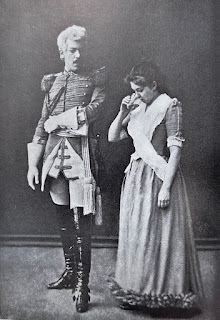"...said Bernard...said Susan...said Rhoda...said Neville...said Jinny...said Louis..."
This is the story of six friends from an age where a first kiss is possible, but still a little shocking, on to maturity and death. They're upper middle class, articulate, privileged, a sort of Bloomsbury set in miniature. (The Wikipedia article suggests who each of the six characters is based on, but I didn't find that very helpful, or even necessarily convincing.)
They're given backstories: Louis is scholarly, but insecure, because his father is 'a banker in Brisbane' and he doesn't have the right accent. Bernard tells stories. It's Jinny who delivers that first kiss. Susan goes to live in the country. Neville is obsessed with Percival, a not very explicit, but pretty clearly sexual, obsession. Rhoda is insecure--well, they're all insecure in one way or another.
The story takes place at interludes over the course of their lives. At first the boys and girls are relatively equal; that changes with schooling; the boys go to some Eton-like school and the girls go to some much less demanding institution. Then there's university for the boys, but not the girls. Then jobs, marriage, etc.
The interesting thing is the structure of the novel--well, Wikipedia says Woolf didn't want to call it a novel, but a playpoem, and perhaps that is a better term, even if a neologism. Though if it's a play, it's unperformable, and while the language is evocative, I'm not sure I'd call it a poem either. It's told entirely in the spoken statements--monologues--of the six characters, all of whom always speak in well-rounded sentences. Maybe some examples?
"'A shadow falls on the path,' said Louis, 'Like a shadow bent.'"
"'Birds are singing up and down and in and out and all around us,' said Susan."
"'I burn, I shiver,' said Jinny, out of this sun, into this shadow.'"
Those are all from the first section when they're young and the monologues are typically just one sentence. The speeches get longer as the book goes on. Here's Louis, when first in school:
"'Now we march, two by two,' said Louis, 'orderly, processional, into chapel. I like the dimness that falls as we enter the sacred building. I like the orderly progress. We file in we seat ourselves. We put off our distinctions as we enter. I like it now, when, lurching slightly, but only from his momentum, Dr. Crane mounts the pulpit and reads the lesson from a Bible spread on the back of a brass eagle.'"
Each jump in time--from childhood, to that first school, to college, to jobs--is separated by an impersonal description of the waves at the shore, beginning in the morning and ending at evening:
"Now the sun had sunk. Sky and sea were indistinguishable. The waves breaking spread their white fans out over the shore, sent white shadows into the recesses of sonorous caves and then rolled back sighing over the shingle."
That's a representative start of a waves section from later in the book.
Bernard gradually becomes the primary speaker: "'Now to sum up,' said Bernard. 'Now to explain to you the meaning of my life.'" The girls fall out first and then the other two boys. But Bernard is the teller of stories. Not entirely alone, though, but as part of a representative generation. A wave.
Anyway, something like that...it is Virginia Woolf and I'm not sure I entirely got it. 😉 Compared to the other novels of hers I've read I still think Mrs. Dalloway and To The Lighthouse are superior. (I'm not that big a fan of Orlando.) This was probably easier than those, certainly easier than To The Lighthouse. That abstract speechifying she uses gives a sense of a generation in time, but at the same she gives up a useful tool for creating believable characters, which diminishes the emotional engagement. I don't know even Bernard in the way I know Mrs. Dalloway, and that does feel like a loss in a novel.
But it is one of the last off my Classics Club list!






















